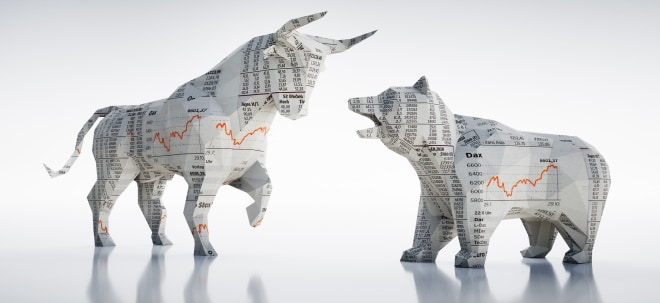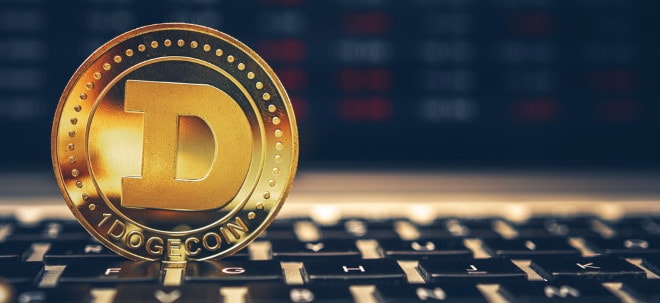Coca-Cola Vs PepsiCo: Which Consumer Giant is Built for the Future?
Werte in diesem Artikel
In the consumer goods space, few rivalries are as iconic or enduring as the one between The Coca-Cola Company KO and PepsiCo Inc. PEP. These two titans have been battling it out for more than a century, not just on supermarket shelves but across airwaves, billboards and now digital screens. While the rivalry was once defined by the cola commercials and the taste tests, the modern battlefield is far more complex — a competition spanning global market share, diversified portfolios, strategic agility and shareholder value.At first glance, Coca-Cola and PepsiCo may seem like mirror images: both are massive, globally recognized brands with deep roots in American culture and omnipresent product lines. But dig deeper, and you will find two fundamentally different companies. Coca-Cola is a beverage purist, focused solely on liquid refreshment, while PepsiCo has evolved into a diversified powerhouse, balancing beverages with an empire of snacks and packaged foods. Their strategic paths, investment philosophies and long-term visions diverge — and it is this divergence that makes the comparison so compelling for investors.This face-off is not just about which brand tastes better; it is about which business performs better. From market share and financial strength to innovation and sustainability, we will break down how each company stacks up in the real metrics — business strategy, revenue performance, portfolio depth, stock valuation and long-term potential.Whether you are a fan of fizz or a believer in balance, the data may surprise you. Let us step into the ring and see who really has the edge.The Case for Coca-Cola: Classic Titan With Renewed SparkCoca-Cola has long been the undisputed king of the global beverage industry — a brand so iconic that it is often the first name that comes to mind when people think of soft drinks. Commanding a 43% share of the global carbonated soft drink (CSD) market, Coca-Cola has maintained its dominance by staying laser-focused on one thing — beverages. This singular focus has allowed the company to build a powerhouse portfolio of more than 500 beverage brands, ranging from the legendary Coca-Cola Classic to innovations like Coca-Cola Zero Sugar, Smartwater, and its growing investments in coffee and energy drinks.What sets KO apart is its asset-light franchise model, in which it owns the brands and marketing muscle while outsourcing bottling and distribution to strategic partners. This model delivers high operating margins, scalability and a strong free cash flow — key ingredients for its long-standing reputation as a dividend aristocrat. The company currently yields a steady dividend of around 3%, backed by resilient cash flows even in volatile markets.Strategically, Coca-Cola has been pivoting from sugary sodas to healthier, functional and premium offerings. From acquiring Costa Coffee to expanding Fairlife’s high-protein dairy products, Coca-Cola is reimagining itself as a broader wellness beverage company. KO is also doubling down on emerging markets, where per-capita consumption is still relatively low but rapidly rising, creating a significant long-term growth opportunity.In a world of growing health consciousness, Coca-Cola is working hard to future-proof its brand by focusing on low and no-sugar alternatives, innovative packaging, and digital transformation through data analytics and AI-driven marketing. Its long-term goals are grounded in sustainability — achieving 100% recyclable packaging by 2030 and becoming water-neutral, which resonates with the next generation of socially conscious consumers.For investors, Coca-Cola offers a compelling blend of stability and slow-burning global growth. Its strong brand equity, disciplined capital strategy and exposure to high-growth regions make it a resilient pick for long-term portfolios, especially for those seeking reliable income and a defensive play in uncertain economic times.The Case for PepsiCo: Balanced Juggernaut Built for ResiliencePEP may have started as KO’s feisty challenger in the cola wars, but it has evolved into something far more diversified and resilient. With a beverage market share of around 25%, PepsiCo might not match Coca-Cola’s dominance in CSDs.However, PEP outpaces KO in overall portfolio strength, thanks to its snacking and convenient food business, worth more than $40 billion, which includes iconic brands like Lay’s, Doritos, Quaker and Cheetos. In fact, more than half of PepsiCo’s revenues comes from snacks and foods, giving the company a two-pronged strategy that provides a buffer against beverage market volatility and allows it to ride consumer trends across categories.PepsiCo’s real strength lies in its balanced and adaptable business strategy. While Coca-Cola is doubling down on drinks, PEP is spreading its bets across consumer tastes and winning. It continues to invest heavily in healthier snacks, plant-based options and better-for-you products. At the same time, PEP is innovating in beverages through products like Bubly sparkling water and zero-sugar Gatorade, and leveraging its acquisition of SodaStream to expand into at-home consumption trends.Unlike Coca-Cola’s leaner operating model, PepsiCo is vertically integrated, with more direct control over manufacturing, distribution and retail execution. While this results in slightly lower margins, it gives the company superior agility and execution capabilities, especially in emerging markets, wherein localized supply chains are key to success. The company’s emphasis on digital transformation, AI-powered demand forecasting, and personalized marketing also puts it ahead of the curve in leveraging technology for growth.Looking forward, PepsiCo has bold ambitions; it plans to be net-zero by 2040. It is also heavily investing in regenerative agriculture and continues to expand its global snacking footprint, particularly in high-growth markets across Asia, Latin America and Africa. The company’s "PepsiCo Positive" sustainability initiative ties profitability to purpose — a strategic alignment that increasingly matters to institutional investors and ESG-focused funds.Price Performance & Valuation of KO & PEPShares of PepsiCo show a declining trend in the year-to-date period due to the ongoing challenges related to subdued category demand in its convenient food business and the impacts of a product recall in the QFNA segment. Meanwhile, Coca-Cola shares have demonstrated steady growth in the past year, driven by resilient business trends. Year to date, PepsiCo shares have declined 6%, whereas Coca-Cola stock has rallied 15.5%. Image Source: Zacks Investment Research From a valuation standpoint, PEP currently trades at a lower forward price-to-earnings (P/E) multiple of 17X compared with Coca-Cola’s 23.8X, making it more attractively priced, driven by its earnings and diversified revenue stream. Image Source: Zacks Investment Research The PEP stock looks cheap from a valuation perspective. Moreover, its diversity, pricing power and innovation engine make it a compelling long-term holding, especially for those seeking both growth and downside protection.Coca-Cola does seem pricey. However, its valuations reflect its strong brand equity, disciplined capital strategy and exposure to high-growth regions, making it a resilient pick for long-term portfolios. If the company sustains its execution, the premium could be warranted.How Does Zacks Consensus Estimate Compare for PEP & KO?PepsiCo’s EPS estimates for 2025 and 2026 moved down 0.2% each in the last 30 days. PEP’s 2025 revenues are projected to decline 0.2% year over year to $91.7 billion, and EPS is expected to ascent 1.4% year over year to $8.27. Image Source: Zacks Investment Research Coca-Cola’s EPS estimates for 2025 have been unchanged in the past 30 days, while the consensus estimates for 2026 moved down by a penny in the same period. KO’s 2025 revenues and EPS are expected to increase 2% and 2.8% year over year, respectively, to $48 billion and $2.96 per share. Image Source: Zacks Investment Research PEP Vs KO: Who Has the Edge?For investors seeking a blend of reliability and global reach, Coca-Cola offers a compelling case. As the undisputed leader in the beverage industry, the company’s streamlined, high-margin model and world-class brand portfolio offer a foundation for stability, resilience and predictable income.KO continues to evolve, introducing healthier, low-sugar alternatives and expanding its footprint in high-growth emerging markets, reinforcing its relevance in a shifting consumer landscape. However, its lofty valuation could be a hurdle for value-oriented investors seeking more compelling entry points or diversified growth exposure.Conversely, PepsiCo is the quintessential all-weather investment. Its diverse mix of beverages and snacks provides a natural hedge against category-specific headwinds, offering exposure to multiple growth levers. While the company is currently navigating shifts in consumer behavior, PepsiCo’s ability to innovate and localize its offerings across global markets positions it for sustained, long-term growth.PEP’s discounted valuation, balanced business exposure and broader growth potential give it a slight edge over Coca-Cola. With solid fundamentals and a discounted valuation, PepsiCo currently presents a more dynamic investment opportunity, particularly for those seeking a mix of defensive strength and forward-looking growth.Both KO and PEP currently carry a Zacks Rank #3 (Hold), reflecting a neutral outlook — but beneath the surface, their strategic differences tell two distinct investment stories. You can see the complete list of today’s Zacks #1 Rank (Strong Buy) stocks here.Zacks Names #1 Semiconductor StockIt's only 1/9,000th the size of NVIDIA which skyrocketed more than +800% since we recommended it. NVIDIA is still strong, but our new top chip stock has much more room to boom.With strong earnings growth and an expanding customer base, it's positioned to feed the rampant demand for Artificial Intelligence, Machine Learning, and Internet of Things. Global semiconductor manufacturing is projected to explode from $452 billion in 2021 to $803 billion by 2028.See This Stock Now for Free >>Want the latest recommendations from Zacks Investment Research? Today, you can download 7 Best Stocks for the Next 30 Days. Click to get this free report CocaCola Company (The) (KO): Free Stock Analysis Report PepsiCo, Inc. (PEP): Free Stock Analysis ReportThis article originally published on Zacks Investment Research (zacks.com).Zacks Investment ResearchWeiter zum vollständigen Artikel bei Zacks
Übrigens: Coca-Cola und andere US-Aktien sind bei finanzen.net ZERO sogar bis 23 Uhr handelbar (ohne Ordergebühren, zzgl. Spreads). Jetzt kostenlos Depot eröffnen und als Geschenk eine Gratisaktie erhalten.
Ausgewählte Hebelprodukte auf Coca-Cola
Mit Knock-outs können spekulative Anleger überproportional an Kursbewegungen partizipieren. Wählen Sie einfach den gewünschten Hebel und wir zeigen Ihnen passende Open-End Produkte auf Coca-Cola
Der Hebel muss zwischen 2 und 20 liegen
| Name | Hebel | KO | Emittent |
|---|
| Name | Hebel | KO | Emittent |
|---|
Quelle: Zacks
Nachrichten zu Coca-Cola Co.
Analysen zu Coca-Cola Co.
| Datum | Rating | Analyst | |
|---|---|---|---|
| 17.04.2025 | Coca-Cola Buy | UBS AG | |
| 19.02.2025 | Coca-Cola Overweight | JP Morgan Chase & Co. | |
| 12.02.2025 | Coca-Cola Kaufen | DZ BANK | |
| 12.02.2025 | Coca-Cola Outperform | RBC Capital Markets | |
| 12.02.2025 | Coca-Cola Overweight | JP Morgan Chase & Co. |
| Datum | Rating | Analyst | |
|---|---|---|---|
| 17.04.2025 | Coca-Cola Buy | UBS AG | |
| 19.02.2025 | Coca-Cola Overweight | JP Morgan Chase & Co. | |
| 12.02.2025 | Coca-Cola Kaufen | DZ BANK | |
| 12.02.2025 | Coca-Cola Outperform | RBC Capital Markets | |
| 12.02.2025 | Coca-Cola Overweight | JP Morgan Chase & Co. |
| Datum | Rating | Analyst | |
|---|---|---|---|
| 24.07.2024 | Coca-Cola Halten | DZ BANK | |
| 31.05.2024 | Coca-Cola Hold | Jefferies & Company Inc. | |
| 07.05.2024 | Coca-Cola Halten | DZ BANK | |
| 25.04.2023 | Coca-Cola Neutral | Goldman Sachs Group Inc. | |
| 24.04.2023 | Coca-Cola Neutral | Goldman Sachs Group Inc. |
| Datum | Rating | Analyst | |
|---|---|---|---|
| 16.02.2018 | Coca-Cola Sell | Goldman Sachs Group Inc. | |
| 10.01.2018 | Coca-Cola Sell | Goldman Sachs Group Inc. | |
| 17.11.2017 | Coca-Cola Sell | Goldman Sachs Group Inc. | |
| 16.11.2017 | Coca-Cola Sell | Goldman Sachs Group Inc. | |
| 26.10.2017 | Coca-Cola Sell | Goldman Sachs Group Inc. |
Um die Übersicht zu verbessern, haben Sie die Möglichkeit, die Analysen für Coca-Cola Co. nach folgenden Kriterien zu filtern.
Alle: Alle Empfehlungen

